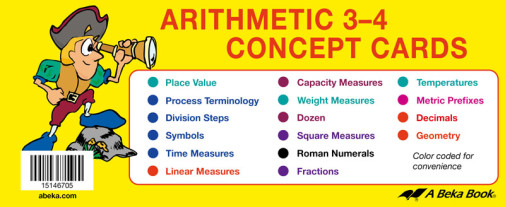We use cookies to make your experience better. To comply with the new e-Privacy directive, we need to ask for your consent to set the cookies. Learn more.
Arithmetic 3-4 Concept Cards
This flashcard set is really a must! Constant review allows your student to revisit what they have learned to keep it fresh. With so much to learn, they sometimes miss or forget material that has been covered. These are organized by category and easy to find. They come in a storage box with a wraparound lid. Compatible with Abeka Arithmetic Grades 3-4.
From converting 5/10 to .5 to the meaning of deci-, use these flashcards to make sure that your child understands arithmetic concepts and to build his computing speed. Correlated with the arithmetic third and fourth grade textbooks, these concept cards can be used as teaching visuals and for systematic review as explained in the Homeschool Arithmetic Curriculum/Lesson Plans for those grades. Cards are numbered and labeled with color coding for similar concepts. Initial cards provide table of contents for the front and back of each card so that you can easily locate just the card you need. Contains 193 cards with answer or corresponding concept on the back.
Featured Topics!
* Arithmetic terms
* Significant temperatures
* Fractions
* Roman numerals
* Metrics
* Symbols
* Shapes
* Time, linear, capacity, and weight measures, and more!
Although new to our catalog, this math curriculum is certainly not new to the homeschool community. Abeka has been a tried-and-true math program amongst homeschoolers for many years. Taking a traditional, spiral approach, this series presents math concepts at the simplest level and builds on those concepts each year while offering continual review so students can fully grasp the concepts being taught. Abeka also teaches math from a faith based worldview and integrates biblical application throughout the program.
The elementary math lays a solid foundation for the higher level mathematics, and emphasizes oral and written drill. For the younger grade levels, the lesson instruction includes visual aids, games and activities. As the grades progress, the lessons become more independent but are still teacher directed. For Kindergarten, a worktext and teacher key is available along with several manipulative components. Math kits for grades 1-6 are sold in a child and parent kit (each sold separately). The child kit includes the consumable worktext and a test/speed drills book. The contents of the parent kit vary depending on the grade level; however all will include a curriculum guide for lesson plans as well as answer keys for the worktext and test/speed drills. It is suggested to purchase both the student and parent kits for a full math curriculum. The curriculum guide incorporates flashcards/charts into some of the lessons. These are available to purchase separately.
Junior high moves toward Intermediate Mathematics and PreAlgebra. Worktexts at these levels are still consumable. Intermediate Mathematics is a new and improved seventh grade course, reviewing all math skills previously learned while introducing algebra and geometry. This new course focuses more on understanding the concepts rather than just memorizing. The Intermediate Kit includes the worktext and test/quiz book. A teacher edition, solution key, supplemental exercises book and key are all available for this level. The newly revised PreAlgebra text continues with review and bridges the gap between basic mathematical concepts and more advanced topics. This level has a worktext, quiz/test book and key, teacher edition, and solution key.
High school levels include Algebra 1 through Precalculus. Concepts are taught in a clear, logical order with detailed explanations and step-by-step examples. Student textbooks are non-consumable at this level. Each section has practice problems taught in that section and review problems from previous sections. A teacher edition (to help guide your student through the courses), solution key, quiz/test book and key are also available for each course.
Abeka Math is a solid, traditional math program with a biblical focus. Each year builds upon the previous while continuing to review. The math facts are drilled and mastered at the elementary levels so students can be confident and successful in subsequent levels. The review can move rather quickly; therefore if your student is moving into Abeka from another program, you should consider taking a look at the scope and sequence before deciding where to start in the series.
Concepts presented include place value up to hundred millions; addition facts through 18, column addition, carrying, checking; subtraction facts through 18, borrowing; multiplication 0-12, multi-digit factors with carrying and checking; division 1-12 tables, long division with remainders and checking; story problems; rounding to the nearest ten, hundred, and dollar; Estimation of products; averaging numbers; roman numerals; English and metric measures, solving measurement equations and story problems; counting and combining coins and bills; solving multi-process combinations; geometric plane and solid shapes, terms, perimeter, area; interpreting and constructing bar graphs, line graphs, and pictographs; finding the unknown number in an equation, fractions: terminology, mixed numbers, comparing, adding, subtracting, equivalent, reducing to lowest terms. 170 lessons
| Product Format: | Paperback |
|---|---|
| Brand: | A Beka Book |
| Grade: | 3 |
| Length in Inches: | 10.25 |
| Width in Inches: | 4.625 |
| Height in Inches: | 2.6875 |
| Weight in Pounds: | 3.15 |

